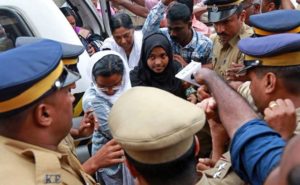The young woman is Hadiya, from Vaikom, Kerala, whose ordeal is well known by now. Kept in illegal custody in her father’s home sanctioned by the Kerala high court’s twisted Brahmanical logic, she was finally being heard by the Supreme Court on November 27. The moment she stepped out of that veritable prison, she burst out, shouting to the world her choices. In court, she exuded calm courage and grace while answering the learned judges’ queries.
I genuinely wanted to reflect on this encounter in the language of modern democratic politics and the Indian constitution. Many have already spoken and written in that fashion by now. But the very staging of power in the courtroom was such that I can no longer see how that fits. Rather, I am able to conceive of the unfolding of the event only in terms of the virulent Brahmanical order that is increasingly the naked banal reality in India – and undeniably, in Kerala as well.
As I followed the updates from court, I thought: this is how it is going to be when we reach the gates of Vaikuntha. At the gates of Vishnu’s abode, divine beings will weigh our merits and our failings, assess our worthiness, hand over our penances and briskly shoo us towards their performance. And so Hadiya was heard, assessed and her means of atonement speedily decided. There was no guarantee that she would be heard, though she was summoned for that purpose. The reports of the guards of hell, to which she was subjected, seemed equally important to the celestial beings – the ‘findings’ of the National Investigative Agency (NIA).
The staging of power in the courtroom affirmed that the gates of Vaikuntha are indeed far more exalted and rarefied than the miserable world of caste and gender inequality that poor humans have to endure. And so when senior counsel Indira Jaisingh made a reference to the reality of that world and its presence in the courtroom by asking whether Hadiya would have been treated thus had she been a man, the question seems to have evoked disgust from the bench. The very prospect that the gates of Vaikuntha may be tainted by human ills sounded abhorrent to them. Where did gender discrimination enter from, they asked. Swiftly asserting their infallibility of course entails silencing the other, and the exalted beings did not tarry.

